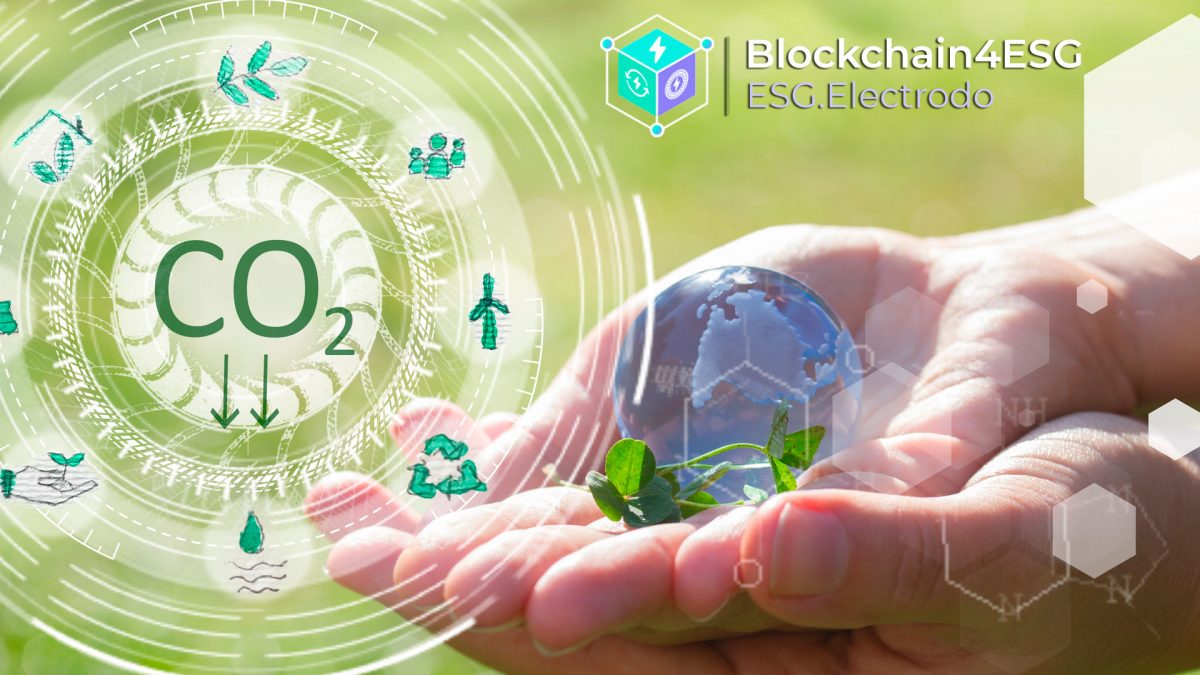
Introduction
Our journey with Blockchain technology continues, as we strive to enhance the resilience and sustainability of value chains while creating innovative, data-driven businesses and markets. As we delve into the realm of sustainability ESG reporting Agri-food Data Spaces, a prime example of this effort is our product, Electrodo, which distinguished us as the first Ukrainian company to win and participate in the i4Trust innovation program – a part of the EU’s Horizon 2020 research and innovation funding initiative. Under i4Trust, we developed the ESG.Electrodo solution and successfully executed the “Blockchain4ESG” experiment in collaboration with a consortium of six industrial organizations from Spain and Ukraine. ESG.Electrodo, a data brokerage module within the Electrodo platform, is designed for ESG data management and reporting. It plays a crucial role in driving and accelerating the transition of industrial SMEs in Agri-food towards a low-carbon economy, as well as in creating and fostering an ESG data market. By addressing issues of ESG data availability, completeness, integrity, and reliability, ESG.Electrodo contributes to climate-related risk assessment and management, thereby bolstering the resilience and sustainability of the Agri-food industry. More details on this experiment can be found in our Blockchain4ESG – Impact story.
Additionally, a key objective was to establish a Data Space where participants could exchange ESG-related information and prepare ESG disclosures and reports. Implementing such a Data Space within the i4Trust initiative involved developing three main technological building blocks, alongside one that is directly related to the management of the data space itself. The technical building blocks consist of the sections: Data Interoperability, Data Sovereignty and Trust, and Data Creation.

The Data Interoperability section
The Data Interoperability section consists of the following subsections:
- Data Exchange API.
- Data Models and Formats.
- Provenance & Traceability.
The Data Interoperability building blocks facilitates and ensures efficient data exchange within the data space among participants, leveraging the concept of Smart Data Models and the NGSI-LD API during the transmission of information from digital twins. Such standardization of datasets within the data space, combined with standardized information retrieval endpoints, allows every participant of the data space to obtain data from any of the experiment participants in the expected format and manner.
The component of the FIWARE framework that was used during the experiment for exchanging digital twin data is the Orion-LD Context Broker.
The work carried out in the Data Models & Formats section focused on studying the approach to creating and using Smart Data Models. During the experiment, we took the initial steps to create a Smart Data Model, the goal of which is to standardize the representation of ESG reports using the TCFD Recommendations framework.
The Provenance & Traceability section involves the use of FIWARE framework components to record the history of data entering the Context Broker and also the capability to write this data to the blockchain. During our experiment, we decided not to use the FIWARE Canis Major component and existing blockchain adapters, but instead opted for a solution previously developed by our company – Electrodo.Docs. Electrodo.Docs is an open source module focused on document and report notarization by storing the documents and hash of these documents in a IPFS-based storage and blockchain network based on Hyperledger Fabric.
Data Sovereignty and Trust section
Data Sovereignty and Trust section consists of the following subsections:
- Identity Management.
- Trusted exchange.
- Access & Usage Control / Policies.
The Data Sovereignty and Trust building blocks ensure trust between participants in the data space and provide the ability to exchange data based on established access policies. For these purposes, common standards for identification, authorization, and access policies to the data stored in the data space are used.
The Identity Management building block was represented during the experiment by using the Keyrock component from FIWARE, which supports a wide range of standards, such as: OpenIdConnect, SAML 2.0, OAuth2, eIDAS, etc.
The Trusted Exchange building block in the experiment was represented by the iShare protocol, which is based on a JSON REST API architecture. The protocol can operate in both H2M (human2machine) and M2M (machine2machine) communication flows and authenticates based on PKI (Public Key Infrastructure) and signed JWT tokens. Another vital component of the Trusted Exchange building block was the iShare Satellite, which served as a trust authority and provided the ability for every data space participant to ensure that the party they were interacting with during the experiment was trusted.
During the experiment, the Access & Usage Control / Policies building blocks were represented in the form of PEP (Policy Enforcement Point), PDP (Policy Decision Point), PAP (Policy Administration Point), PMP (Policy Management Point), and the delegation evidence data model. The implementation of PEP and PDP was carried out using the Kong API-Gateway plugin. The roles of PAP and PMP were fulfilled by Keyrock.
It’s worth noting separately the capability to apply different licenses to the same dataset for various experiment participants, thanks to the features embedded in the delegation evidence data model.
Data Value Creation section
Data value creation section represents by FIWARE Business Application Ecosystem (BAE) components which enable creation of Marketplace services which participants in data spaces can rely on for publishing their offerings around data assets they own.
Nevertheless, three kinds of standard data asset types are supported by default, namely static data files, right-time data resources provided via NGSI-LD at well defined endpoints, and data processing services, which typically have associated well defined endpoints for providing input data and publish results, both in right-time, using NGSI-LD. Marketplace services are accessible through a portal or via APIs.
The objective of the current experiment did not include the use of the Marketplace. However, one way or another, there was an introduction to its existing functionality, and potential arose for its further use.
Data Spaces Governance section
The Data Spaces Governance section consists of:
- Business agreements.
- Operational agreements.
- Organizational agreements.
Business agreements.
Business agreements primarily represent arrangements regarding the payment model for the data that will be provided and the purposes of data designation and usage. Specifically, the financial aspect of the experiment was examined during the Business Mentoring Program using approaches presented in the Data-Driven Innovation Framework Methodology (for instance, many details and decisions were described in the Miro board that used in experiment, in area of second module, called “Demand Side” in section “Revenue Roadmap”).
Technically, the objectives and purposes of data usage are regulated by the “Licenses” feature, which is implemented in the structure of “Policies” created by the data space participants and stored in AR (Authorization Registry).
This section also includes the definition of the data standard that will be exchanged. For this purpose, we used the Smart Data Models approach and discussed everything in more detail during general calls dedicated to data exchange. “Data dictionaries” were not created at this stage of the experiment.
Operational agreements.
Operational agreements are primarily represented in the form of SLAs (Service Level Agreements).
iSHARE already specifies basic Service Level Agreements for service providers which they need to agree and sign off when they apply to become iSHARE certified service providers. It can be used as a basis by participants for further elaborating requirements for service providers.
Also, Operational Agreements include:
- Lifecycle management of participants;
- Incident management;
- Release and version management of various i4Trust building blocks;
- Change management.
Primarily, all the listed agreements during the experiment stage were verbal agreements between the experiment participants and were overseen by a neutral body represented by IoT DIH (Digital Innovation Hub, Spain) – the trust provider for the experiment. The IoT Digital Innovation Hub operates as a part of the Research & Technology organization AIR Institute.
Additionally, it may include other management processes as necessary as well as reporting as determined by the ecosystem.
When starting a data space based on i4Trust, a base set of operational processes for Participant lifecycle management and Incident management will be available based on iSHARE. On the other hand, the different i4Trust building blocks come with proper release and version management handled within the corresponding FIWARE and iSHARE Communities spaces can use these as foundation for operational agreements and if necessary evolve them further for data space specific requirements.
Organizational agreements.
Governance make sure that data space operates as agreements are made.
The role, control, and position of the “neutral body” represented by IoT DIH ensured the observance of the agreements. Also, according to the experiment’s roadmap, they had the authority to deploy and host the Satellite, which plays a key role in ensuring the data-space’s operations.
iSHARE and FIWARE have an open, not-for-profit and unbiased governance structure in place so that i4Trust Data spaces can refer to iSHARE and FIWARE governance and can use it as the basis for their governance structure. Since in a data space most of the transactions involve multiple parties it is apparent that a business model is agreed upon to at least fund the common infrastructure like governing body on one hand and if desired some common technical infrastructure on the other.
About 482.solutions
Established in 2013, 482.solutions is a Singapore-based international company with headquarter in Ukraine, specializing in the development of industrial Web3 and blockchain-based solutions for the Green Energy, Green Fintech, and Sustainable Value Chain sectors. Leveraging Web3 and blockchain technologies, we create industry-focused infrastructure for Transactive Energy, Voluntary Carbon, and Green Finance markets. Our solutions enhance traceability and transparency in ESG data management and sustainable digital asset management. Electrodo is a flagship product of 482.solutions.
Electrodo a Web3 platform for ESG data and asset management, helping industrial SMEs, clusters, and investors create sustainable value and improve the efficiency of sustainable capital allocation. Electrodo solves the problem of ESG data availability, completeness, integrity, and reliability for climate-related risk assessment and management, as well as contributes to the industrial resilience and sustainability. Electrodo has gained recognition from EUREKA, Sustainable Energy Association of Singapore (SEAS), Microsoft Innovation Center for Sustainability Solutions (MICSS) Singapore, i4Trust, Hyperledger, and Web3 Foundation (Polkadot ecosystem).
- website: electrodo.sg.
- i4Trust experiment: Blockchain4ESG.
- Link to live demo: Electrodo: Blockchain4ESG MVP Demo.

I’m really inspired together with your writing skills as smartly as with the layout for your blog. Is that this a paid subject or did you customize it yourself? Either way keep up the nice quality writing, it’s uncommon to see a great weblog like this one these days!